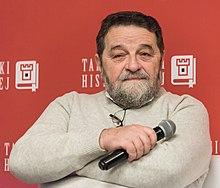|
Konstanty Gebert
Konstanty Julian Gebert (pseudonym Dawid Warszawski; born 22 August 1953) is a Polish journalist[1] and a Jewish activist, as well as one of the most notable war correspondents of various Polish daily newspapers. BackgroundKostanty Gebert was born on 22 August 1953 in Warsaw, son of top Polish United Workers' Party official and former Polish Ambassador to Turkey Bolesław Gebert. He studied at the University of Warsaw. During the 1968 Polish political crisis he participated in students' demonstrations at age 15 with the expectation that his father, a former Communist Party of America organizer, would be proud of him. He commented "I was expecting he'd crack open a bottle of vodka and we'd have a great time. They locked me up at home for three days. Exactly what I would do if it happened to my kid. Fifteen years is not the right age for fighting on the streets. But what heartbreak. I thought I'd become one of the boys. Just like Dad."[2] CareerAnti-CommunismIn 1978, Gebert was one of the main organizers of the so-called Flying University, a secret institution of higher education educating people on various topics forbidden by the Eastern Bloc government of Poland. In 1980, he joined the Solidarity movement and became one of the members of the "Solidarity of Education and Technics Workers" union. In 1989, Gebert was one of the accredited journalists present at the Polish Round Table talks. Since 1990, he has worked as a member of the Polish Council of Christians and Jews. Post CommunismSince 1992, Gerbert has worked at the Polish daily newspaper Gazeta Wyborcza. He served as a war correspondent during the war in Yugoslavia. In 1992 and 1993, he served as an advisor to Tadeusz Mazowiecki, then Special Rapporteur of the Human Rights Commission of the United Nations and its representative in former Yugoslavia. In 1995, he co-founded the Media Development Investment Fund and acted as its vice-chair until 2000.[3] Since 1997, he has served as head of the Midrasz Polish-Jewish monthly. Since 2011, he has been an Associate Fellow of the European Council on Foreign Relations since 2011. He serves as "special advisor on international affairs" with nonprofit organisation Humanity in Action.[4] In a lecture on 9 January 2014 before the Israel Council on Foreign Relations, Gebert said:
He is a member of the European Press Prize preparatory committee.[6] Since November 2021 Gebert is part of the international advisory board of the Austrian Service Abroad. Awards
WorksBooks catalogued in the Library of Congress are:
References
Wikimedia Commons has media related to Konstanty Gebert. |
||||||||||||||||||||||||
